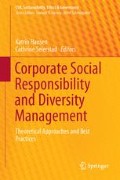Abstract
Having originated in the USA in the 1980s, diversity is now a discourse and policy paradigm with global reach. This chapter discusses the theoretical and practical shape that diversity management has taken within the UK context. It charts the shift from equality to diversity and examines what this has meant for selected stakeholders, as well as considering how the corporate world has engaged with the diversity concept and how the British legal context has impacted upon policy. Despite depending on business case arguments, some organisations are positioning their diversity efforts within the CSR space, which the chapter concludes will be a real test of organisational commitment.
Access this chapter
Tax calculation will be finalised at checkout
Purchases are for personal use only
Notes
- 1.
The equality legislation referred to in this chapter applies to England, Scotland and Wales. There is a separate statutory framework in Northern Ireland.
- 2.
The Equality and Diversity Forum (EDF) is a network of national organisations committed to equal opportunities, social justice, good community relations, respect for human rights and an end to discrimination based on age, disability, gender and gender identity, race, religion or belief and sexual orientation. Its members are national non-governmental organisations.
- 3.
Other possible job titles include diversity manager, diversity officer or diversity adviser; sometimes the job title includes equality.
References
ACAS (2014) Delivering equality and diversity. ACAS, London
CIPD (2012) Diversity and inclusion: Fringe or fundamental? Chartered Institute of Personnel and Development, London
Cockburn C (1989) Equal opportunities: the short and the long agenda. Ind Relat J 20(3):213–225
Cockburn C (1991) In the way of women. Macmillan, Basingstoke
Colling T, Dickens L (2001) Gender equality and trade unions: A new basis for mobilisation? In: Noon M, Ogbonna E (eds) Equality, diversity and disadvantage in employment. Palgrave, Basingstoke
Cornelius N, Gooch L et al (2000) Managers leading diversity for business excellence. J Gen Manag 25(3):67–78
Dickens L (1997) Gender, race and employment equality in Britain: inadequate strategies and the role of industrial relations actors. Ind Relat J 28(4):282–289
Dickens L (2007) The road is long: thirty years of equality legislation in Britain. Br J Ind Relat 45(3):463–494
Dickens L, Townley B et al (1988) Tackling sex discrimination through collective bargaining. Equal Opportunities Commission, Manchester
Foster C, Harris L (2005) Easy to say difficult to do: diversity management in retail. Hum Resour Manag J 15(3):4–17
GEO (2013) Think, act, report. Government Equalities Office, London
Greene AM, Kirton G (2009) Diversity management in the UK. Organizational and stakeholder experiences. Routledge, London
Hepple B (2010) The new single equality act in Britain. Equal Rights Rev 5:11–24
Hoque K, Noon M (2004) Equal opportunities policy and practice in Britain: evaluating the “empty shell” hypothesis’. Work Employ Soc 18(3):481–506
Jewson N, Mason D (1986) The theory and practice of equal opportunities policies: liberal and radical approaches. Soc Rev 34(2):307–334
Jones D, Pringle J et al (2000) ‘Managing diversity’ meets Aotearoa/New Zealand. Pers Rev 29(3):364–380
Kaler J (2001) Diversity, equality, morality. In: Noon M, Ogbonna E (eds) Diversity, equality and disadvantage in employment. Palgrave, Basingstoke
Kandola R, Fullerton J (1994) (2nd edn 1998). Managing the mosaic: diversity in action. London: Institute of Personneland Development.
Kersley B, Alpin C et al (2006) Inside the workplace: findings from the 2004 workplace employment relations survey. Routledge, Abingdon
Kirton G (2008) Managing multi-culturally in organizations in a diverse society. In: Clegg S, Cooper C (eds) The Sage handbook of organizational behavior. Sage, London, pp 309–322
Kirton G, Greene AM (2006) The discourse of diversity in unionised contexts. Pers Rev 35(4):431–448
Kirton G, Greene AM (2009) The costs and opportunities of doing diversity work in mainstream organisations. Hum Resour Manag J 19(2):159–175
Kirton G, Greene AM (2016) The dynamics of managing diversity. Routledge, London
Liff S (1997) Two routes to managing diversity: individual differences or social group characteristics. Employee Relat 19(1):11–26
Liff S, Dickens L (2000) Ethics and equality: reconciling false dilemmas. In: Winstanley E, Woodall J (eds) Ethical issues in contemporary human resource management. Basingstoke, Macmillan, pp 85–101
Maxwell G, Blair S et al (2001) Edging towards managing diversity in practice. Employee Relat 23(5):468–482
Noon M (2007) The fatal flaws of diversity and the business case for ethnic minorities. Work Employ Soc 21(4):773–785
Point S, Singh V (2003) Defining and dimensionalising diversity: evidence from corporate websites across Europe. Eur Manag J 21(6):750–761
Schneider S (2001) Diversity now the ultimate test of management capacity. Equal Oppor Rev 96:11–17
Schneider S, Northcraft G (1999) Three social dilemmas of workforce diversity in organizations: a social identity perspective. Hum Relat 52(11):1445–1467
SHRM (2009) Global diversity and inclusion. Society for Human Resource Management, Alexandria
van Wanrooy B, Bewley H et al (2013) The 2011 workplace employment relations study: first findings. Department for Business, Innovation and Skills, London
Webb J (1997) The politics of equal opportunity. Gend Work Organ 4(3):159–169
Author information
Authors and Affiliations
Corresponding author
Editor information
Editors and Affiliations
Rights and permissions
Copyright information
© 2017 Springer International Publishing Switzerland
About this chapter
Cite this chapter
Kirton, G., Greene, Am. (2017). Understanding Diversity Management in the UK. In: Hansen, K., Seierstad, C. (eds) Corporate Social Responsibility and Diversity Management. CSR, Sustainability, Ethics & Governance. Springer, Cham. https://doi.org/10.1007/978-3-319-43564-0_3
Download citation
DOI: https://doi.org/10.1007/978-3-319-43564-0_3
Published:
Publisher Name: Springer, Cham
Print ISBN: 978-3-319-43563-3
Online ISBN: 978-3-319-43564-0
eBook Packages: Business and ManagementBusiness and Management (R0)

